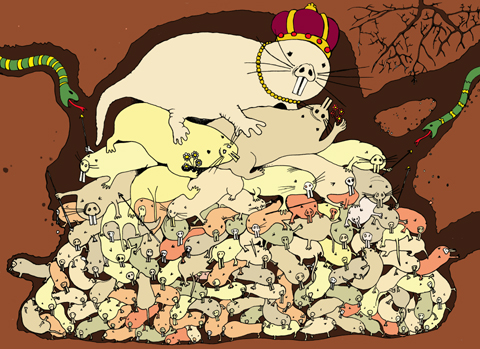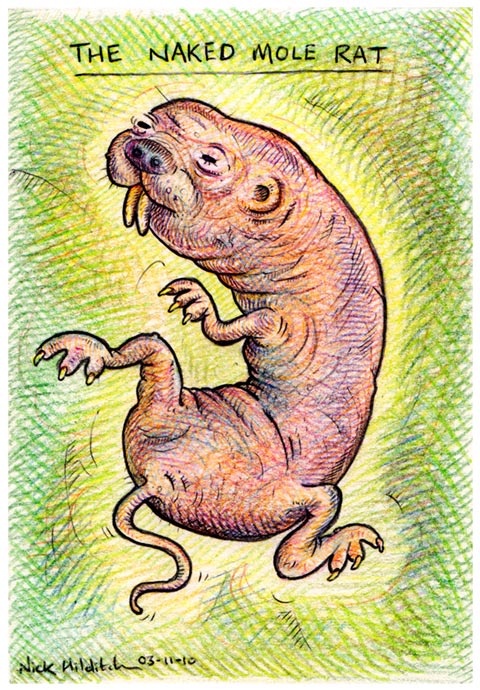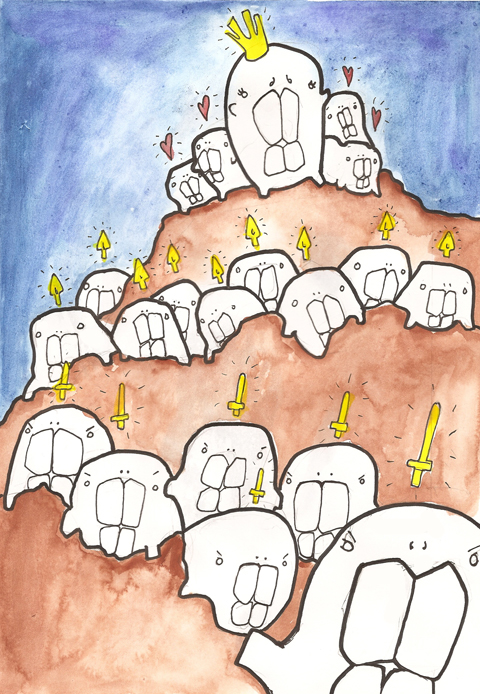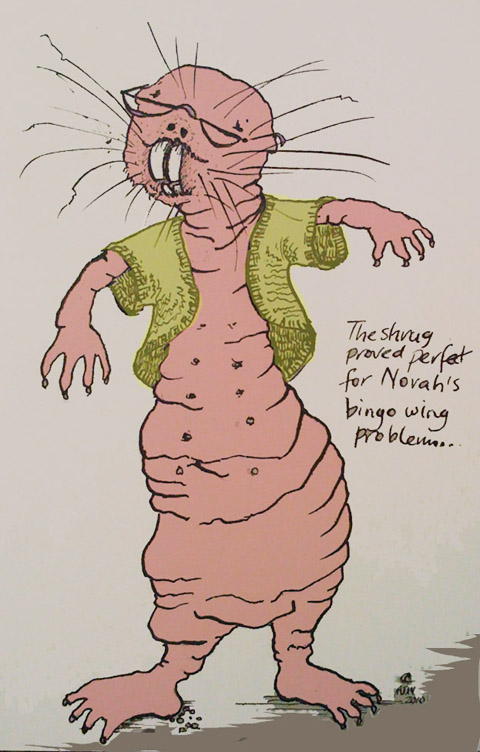Amelia’s Anthology of Illustration has now been reviewed widely on the internet. Here are some links to recent reviews and interviews with me:
Cheapzine.
Kevin Blowe for Red Pepper.
Smack That.
Inky Goodness.
Creative Review.
Creative Boom.
Thereza Rowe.
The Ecologist.
Pikaland interview.
Pikaland review.
Make Lemonade review.
Imaginative Bloom review.
Skype interviews with the Circus Project:
If you would like a copy for review get in touch with me.

‘Chanel No.5′ designed by Jean Helleau. Illustration by Sandra Contreras
When Freud pondered the question of ‘what women want, viagra 40mg ’ someone should have told him that there are few things more desirable than a beautiful bottle of scent. Since the early 20th century, the perfume flaçon (small bottle) has taken on many weird and wonderful guises – some of which have gone on to become cultural artefacts and artist’s muses. By no means a comprehensive list, here is a small selection of some of the most jaw-dropping flaçons you’ll ever encounter – some of which even manage to upstage the scents they contain.
Chanel Nº 5
“I always launch my collection on the 5th day of the 5th month, so the number 5 seems to bring me luck – therefore, I will name it Nº 5,” proclaimed Mademoiselle Chanel after putting her initial doubts to one side and deciding to branch out into fragrance. The name itself summed up the scent’s abstract nature, and was a two-fingered salute to the other flowery perfume names at the time. Launched in 1921, No. 5 made greater use of synthetic ingredients, resulting in a blend of rose and ylang ylang that is rich, intoxicating but decidedly ‘unfloral.’ The first bottle was designed by the lady herself, modelled on the Charvet toiletry bottle that once belonged to her then-lover Captain Arthur ‘Boy’ Capel. The resulting flaçon we know and love was created in 1924 by Jean Helleau, and went on to become the subject of Andy Warhol’s famous ‘pop art’ prints, as well as being on permenant display in New York’s Musuem of Modern Art (MOMA) since 1959. The rich gold coloured liquid seen vividly through the glass of the minimalist square bottle, with its simple black letters and jewel-like stopper simply screams luxury. 86 years on, it is still capable of stopping women’s hearts – my fair own included.
Shalimar by Guerlain
‘Shalimar’ designed by Raymond Guerlain. Illustration by Stéphanie Thieullent
Named after the Shalimar Gardens in Lahore, and meaning ‘temple of love’ in Sanskrit, you could half expect a genie to emerge from this fan-shaped bottle with sapphire-coloured stopper, but the sweet vanilla fragrance inside is just as mesmerising. Designed by Raymond Guerlain in 1925 and manufactured by Cristal Baccarat (who along with Lalique, first turned the perfume flaçon into an objet d’art) the design of Shalimar was inspired by the fountains one might find in Indian palaces, and was displayed at the Decorative Arts Exhibition in the same year. The bottle has recently been given a modern make-over by jewellery designer/socialite Jade Jagger, who hasn’t strayed that far from the original, and produced a slightly sleeker version that Raymond himself would have been happy with.
Flower by Kenzo
‘Flower by Kenzo’ designed by Serge Mansau. Illustration by Kayleigh Bluck
I love the beautiful simplicity of Flower by Kenzo – how the tall thin glass leans gracefully to one side like a delicate stem in a summer breeze, echoing the sweet floral fragrance within – with a trompe l’oeil image of a flower appearing as if it were inside the bottle itself. Launched in 2000, the flaçon was designed by Serge Mansau, a French glass sculptor and stage decorator, who had already honed his craft designing flaçons for the likes of Dior and Hermés. He was given the concept of a flower by Kenzo’s artistic director Patrick Geudj, who wanted to highlight it as a powerful symbol for peace, and was particularly inspired by photographer Marc Ribaud’s image March in Washington (21st of October 1967) in which a girl holds a flower in front of a gun that is being pointed at her. Who knew a perfume could be political?
Shocking by Schiaparelli
Schiaparelli’s ‘Shocking’ designed by Leonor Fini. Illustration by Joana Faria
Inspired by a bust of Mae West, who was one of Schiaparelli’s major clients, 1937’s “Shocking” was designed by Argentine painter Leonor Fini, and best exemplifies Schiaparelli’s role in the surrealist movement (her designs included her famous lobster dress, and a hat in the shape of high heeled shoe.) The name was inspired by Cartier’s famous ‘shocking pink’ diamond the Tête de Belier (Ram’s Head) and Shocking’s encasing box was dyed in the same pink shade to match. In an era where few fashion houses were releasing perfume, ‘Shocking’ was Schiaparelli’s attempt to compete with her nemesis Chanel (although sadly unlike her rival, the label did not adapt to the changes brought about by WWII and closed in 1954.) The scent itself – a rather dry powdery bouquet of honey rose and jasmine – may not be to everyone’s taste, but the bottle still remains a little piece of perfume history.
Alien by Thierry Mugler
‘Alien’ designed by Thierry Mugler. Illustration by Karolina Burdon
Designed by Mugler himself, Alien is a bright amethyst and gold flaçon, made to appear like a ‘sacred stone’ brings to mind 1980’s sci-fi films such as Blade Runner and Tron – and is a good example of the designer’s flamboyant, theatrical style (check out Beyoncé’s motorcycle corset for a better idea). Alien was Mugler’s second fragrance, which he described as a nod to ‘ultra-feminity’ and contains notes of sambac jasmine and cashmeran wood, creating a soft woody- amber bouquet. The flaçon according to the designer “symbolises thoughtfulness and peace of mind” despite appearing as if it’s going to hatch a new life form on a mission to destroy all humanity as we know it, HG Wells-style.

Naked Mole Rat by Paul Shinn.
Every now and again something quite random catches my eye… and so it was a few months ago when I came across a news story about the *sabre-toothed sausage* – otherwise known as the naked mole rat. And why, malady you may ask, medical did this curious creature engage me so? Aside from the opportunity to showcase some fab illustrations of course.

Illustration by Abigail Daker.
Scientist Dr Chris Faulkes at the University of London has been studying these bizarre animals for twenty years, and what grabbed me about the story on the BBC News website was the unusual social structure of mole rats, who live in groups of up to 300 individuals.

Illustration by Nick Hilditch.
I’ll put aside for the moment the fact that “queen” mole rats get all the action – forming long term bonds with her lucky selected suitors (note the plural use of the word here) and ensuring that for most mole rats sex is something they will never experience – and instead focus on the interesting ways in which mole rats care for their entire community.

Naked Mole Rat by Reena Makwana.
For rather like bees, ants or termites, the mole rats care for their colonies as a whole, with the smaller mole rats taking on the roles of workers, and the larger ones fighting off any pesky intruders, eg snakes. They live for an exceptionally long time for such little beasties (up to 30 years) and appear to be immune to cancer… hence the intense interest from the scientific community.

Heirarchy Of Sausages by Gareth A Hopkins.
They may look bloody funny, but I think that we would do well to learn from creatures such as the Sabre-Toothed Sausage. After all, living in such close knit communities clearly works wonders for them… and they dig with their teeth – how cool is that?

Stacie Swift‘s Naked Mole Rat.

Naked Mole Rat by Laura Nuttall.

Alison Warner‘s mole rat.
Categories ,Alison Warner, ,BBC News, ,Cancer, ,community, ,Dr Chris Faulkes, ,Gareth A Hopkins, ,Laura Nuttall, ,Lemonaday, ,Naked Mole Rat, ,Nick Hilditch, ,Paul Shinn, ,Reena Makwana, ,Sabre-Toothed Sausage, ,Stacie Swift, ,University of London
Similar Posts:
- New Designers 2011 Part One: Contemporary Craft Graduate Show Review
- For all your MAC problems!
- What are you like?
- Pick Me Up Graphic Arts Festival 2013: Pick Me Up Selects Review
- â




